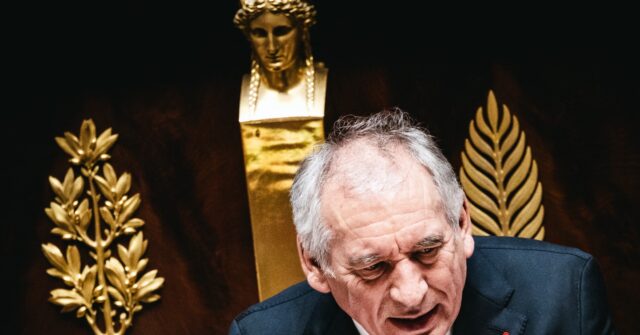In an apparent attempt to fend off a re-run of the quick collapse of his predecessor, French Prime Minister François Bayrou threw out some red meat to the right in his maiden speech to the National Assembly, backing proportional representation, increased deportations, and avoiding heavy tax hikes on businesses. However, it remains to be seen how long Bayrou can keep the knives at bay in Paris.
Less than a month into office, Prime Minister Bayrou acknowledged Tuesday that the vast majority (84 per cent) expect his government to fall this year and joked that even he struggles to understand the “optimism” of the remaining 16 per cent, Le Figaro reports.
Bayrou, the 73-year-old neo-liberal Democratic Movement (MoDem) Mayor of Pau, was the fourth prime minister to be installed in the Hôtel Matignon by President Macron last year after former EU Brexit negotiator Michel Barnier became the first prime minister to be ousted by the National Assembly in over six decades after serving a record-low 91 days in office.
With a burgeoning budgetary crisis and the parliament in Paris stuck in an effective three-way split between the leftist New Popular Front (NFP), neo-liberal Macronist allies, and the populist National Rally (RN) of Marine Le Pen, much of the same factors that doomed the Barnier government remain in place for the new prime minister.
Apparently recognising the threat of Le Pen once again joining with the left to oust his government, Bayrou attempted to track further right than Barnier, notably on corporate taxes, which his predecessor argued needed to rise in order to pay down France’s ballooning debt. The PM argued in his first general policy speech before the National Assembly that businesses “must be protected against exponential increases in taxes and charges” as companies produce “wealth and employment, for the entire country”.
However, the biggest piece of meat thrown out to the right in the speech was Bayrou backing proportional representation in legislative elections, or allocating the number of parliamentary seats based on the number of votes received. Despite winning the most votes by a significant margin in last year’s snap elections, Le Pen’s National Rally was awarded the third most seats in the National Assembly, behind the leftist New Popular Front and Macron’s Ensemble coalition.
The prime minister said that proportional representation is the only method “that allows everyone to be themselves, authentically, without getting bogged down in insincere alliances.” However, it is unclear how Bayrou would seek to implement such a measure, given the likely opposition from the left and centrists.
In his speech, Bayrou also said that concerns over immigration should be recognised and that it is incumbent upon the government to increase deportations, with over nine in ten deportation orders currently going unfulfilled. Yet, his proposal of relaunching the “interministerial immigration control committee” was criticised by National Rally president Jordan Bardella as punting on the issue rather than a “concrete” solution.
Similarly, the prime minister sought to sidestep the issue of pensions. In 2022, the government of then-PM Élisabeth Borne used the Article 49.3 constitutional loophole to increase the state retirement age from 62 to 64 without a vote in the National Assembly. The move sparked weeks of riots and deeply undercut public support for her government.
Both the leftist New Popular Front and Le Pen’s National Rally have both demanded that the move be rolled back and the issue was central to the two disparate factions joining together to oust Michel Barnier in December.
While Bayrou said that “France has never been as indebted as today” and argued that tough financial decisions lie ahead, he would not make a firm commitment on pensions, rather pushing for months of fresh negotiations on the matter between various parties.
Member of the far-left France unbowed (La France Insoumise/LFI) party Éric Coquerel said that “renegotiation doesn’t mean anything, it is a mirage for those who want to believe in it,” adding that the left was “not elected to allow Macronism to continue” and therefore the LFI will once again table a motion to remove the prime minister.
It remains to be seen, however, if the Socialist Party — another member of the NFP — will join the motion after pushing for compromise with Bayrou on pensions. It also remains to be seen if Le Pen’s faction will hold its powder dry or once again move to topple the government. Following the speech, Le Pen’s top deputy, Jordan Bardella, did not go so far as to back a censure motion, was deeply critical.
“At the end of a soothing speech, François Bayrou demonstrated that he was not the man of rupture, but of soft continuity, of chatter and ‘endless’ consultation,” Bardella wrote on X. “Nothing on purchasing power, nothing on insecurity, nothing concrete on immigration: the lives of the French are the great absentee from this speech for nothing.”
Follow Kurt Zindulka on X: Follow @KurtZindulka or e-mail to: [email protected]
Read the full article here
